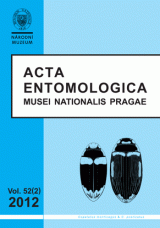Wing polymorphism in European species of Sphaeroceridae (Diptera)
Roháček Jindřich
Acta Entomologica Musei Nationalis Pragae 52(2): 535-558, 2012
Views: 1279
Abstract: The wing polymorphism is described in 8 European species of Sphaeroceridae
(Diptera), viz. Crumomyia pedestris (Meigen, 1830), Phthitia spinosa (Collin,
1930), Pteremis fenestralis (Fallén, 1820), Pullimosina meijerei (Duda, 1918),
Puncticorpus cribratum (Villeneuve, 1918), Spelobia manicata (Richards, 1927),
Spelobia pseudonivalis (Dahl, 1909) and Terrilimosina corrivalis (Villeneuve,
1918). These cases seem to belong to three types of alary polymorphism: i)
species with separate macropterous and brachypterous forms – Crumomyia
pedestris, Pteremis fenestralis, Pullimosina meijerei; ii) species with a
continual series of wing forms ranging from brachypterous to macropterous –
Puncticorpus cribratum, Spelobia pseudonivalis, Terrilimosina corrivalis; iii)
similar to the foregoing type but with only slightly reduced wing in the
brachypterous form – Phthitia spinosa, Spelobia manicata. The variability of
venation of wing polymorphic and brachypterous species of the West-Palaearctic
species of Sphaeroceridae was examined and general trends in the reduction of
veins during evolution are defined. These trends are found to be different in
Copromyzinae (C. pedestris) and Limosininae (all other species) where
6 successive stages of reduction are recognized. The first case of a specimen
(of Pullimosina meijerei) with unevenly developed wings (one normal, other
reduced) is described in Sphaeroceridae. Causes of the origin of wing
polymorphism, variability of wing polymorphic populations depending on
geographical and climatic factors, importance of wing polymorphism in the
evolution of brachypterous and apterous species and the probable genetic
background of wing polymorphism in European species are discussed. Pullimosina
(Pullimosina) meijerei is recorded for the first time from the Svalbard Islands
(Norway) and Terrilimosina corrivalis is newly recorded from Romania.
Key words: Diptera, Sphaeroceridae, wing polymorphism, evolution, wing venation, variability, Europe, Palaearctic Region
Papers
Paradiplatys kubani sp. nov. from Laos (Dermaptera: Diplatyidae)A new synonymy in the genus Rhysostethus (Hemiptera: Heteroptera: Reduviidae)Description of Physopelta finisterrae sp. nov. from Papua New Guinea (Hemiptera: Heteroptera: Largidae)Review of the Stenoscelidea complex and key to the known genera of Stenoscelideini (Hemiptera: Heteroptera: Coreidae)Redescription of the Madagascan endemic genus Anoano with a new synonymy (Hemiptera: Heteroptera: Pentatomidae)A review of Copelatus from Cuba, with the description of two new species (Coleoptera: Dytiscidae: Copelatinae)New Leiodinae (Coleoptera: Leiodidae) from India and Papua New GuineaAn unusual new Onthophagus from New Guinea (Coleoptera: Scarabaeidae: Scarabaeinae)A revison of the genus Anthaxia from the Philippines (Coleoptera: Buprestidae: Buprestinae: Anthaxiini)A review of the genus Laemoglyptus from the Himalayas (Coleoptera: Cantharidae)A new species of the genus Atarphia (Coleoptera: Nitidulidae) from ChinaNew species of Adapterops (Coleoptera: Anthribidae) from east Madagascar with a key to species and notes on sexual dimorphism and biodiversity of the familyLixus davidiani, a new weevil species from Aras Valley (Coleoptera: Curculionidae: Lixinae)Terocelion gen. nov., a new Oriental genus of Keroplatidae (Diptera) with pectinate antennaeA new species of the genus Trichomyia (Diptera: Psychodidae) and new faunistic data on non-phlebotomine moth flies from the Podyjí NP and its surroundings (Czech Republic)Wing polymorphism in European species of Sphaeroceridae (Diptera)Diversity and host associations of aphid parasitoids (Hymenoptera: Braconidae: Aphidiinae) in the farmlands of western IranFirst amber fossil Rhysipolini (Hymenoptera: Braconidae): a new genus and species in Early Eocene Cambay amberDiscovery of the bee genus Perdita in the West Indies (Hymenoptera: Andrenidae): a new species from Isla Cabritos in the Dominican RepublicCatalogue of the type specimens of beetles (Coleoptera) deposited in the National Museum, Prague, Czech Republic. Trogossitidae, Cleridae, Prionoceridae, Melyridae, Dasytidae, Rhadalidae and MalachiidaeMINOSHIMA Y. & HAYASHI M. (2011): Larval morphology of the Japanese species of the tribes Acidocerini, Hydrobiusini and Hydrophilini (Coleoptera: Hydrophilidae). 